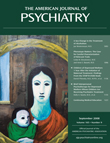To the Editor: We thank Drs. Schulte-Herbrüggen and Roepke for raising issues that we would like to clarify. They suggest that our results of higher activation of the orbitofrontal cortex among subjects with past suicidal acts relative to subjects without a history of suicidal acts in response to angry faces may have reflected between-group differences in borderline personality disorder or related personality traits, notably impulsivity.
We did not assess borderline personality disorder, since in the study of vulnerability to suicidal behavior it has been shown that personality traits may be more relevant than full axis II disorders
(1) . Of note, many scores were very close between subjects with and without a history of suicidal acts (e.g., mean motor impulsivity score: 14.3 [SD=6.5] versus 14.8 [SD=6.3], respectively), suggesting that both groups were well-matched on certain measures.
Regarding personality traits, we do agree with the statistical comments made by Drs. Schulte-Herbrüggen and Roepke. The “personality question” is of major importance to the conceptualization of suicidal behavior. Many studies have shown that vulnerability to suicidal acts is associated with heritable personality traits
(1,
2) . The main concept is that these personality traits constitute clinical aspects of the vulnerability to suicidal acts—traits that may overlap with borderline personality disorder as well as other disorders
(3) . Therefore, it would not be surprising if higher activity in the orbitofrontal cortex in response to angry faces was linked to both a history of suicidal acts, as we suggested, and also impulsivity or affective lability. These issues should be further investigated among our study sample.
To answer Drs. Schulte-Herbrüggen and Roepke’s proposal, all suicidal acts in our study sample were carried out during a major depressive episode. However, it may not be relevant to distinguish impulsive (nondepressive state [theoretically], impulsivity trait linked) from nonimpulsive (depressive state [theoretically], nonimpulsivity trait linked) acts, since it has previously been reported that impulsivity trait and impulsivity of the suicidal act are largely dissociated
(4) . Impulsive acts may be committed during a depressive episode by nonimpulsive individuals.
Last, we did not assess the severity of past depressive episodes. This assessment should be conducted in future studies.

